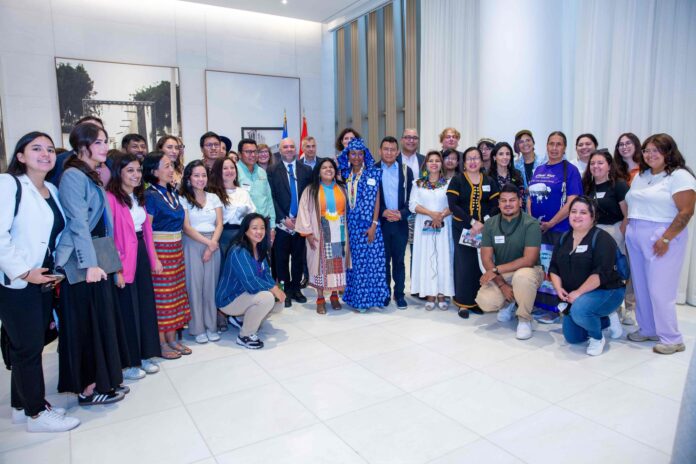The COP28 Presidency has announced new measures to enhance the effective participation of indigenous peoples and authentic visibility of Indigenous People-led solutions at COP28, the high-level climate talks to be held in Dubai in November.
Measures include financial support for Indigenous elders to attend the Conference, subsidized accommodations for 150 delegates from Indigenous organizations, the first-ever translation services for Indigenous Peoples, and funding a report on the economic opportunities of providing direct access to finance for Indigenous Peoples and Local Communities undertaking climate action.
The announcement was made by Razan Al Mubarak, UN Climate Change High-Level Champion for COP28, at an event on Friday co-hosted by the COP28 Presidency and the International Indigenous Peoples Forum on Climate Change.
“Indigenous Peoples are one of the nine official constituencies – organizations which have the status of observers – in the United Nations Framework Convention on Climate Change,”
said Al Mubarak.
“Still, their valuable perspectives remain underrepresented in multilateral climate processes, and they receive a very small share of the international funding for climate action.”
The COP28 Presidency and the UN Climate Change High-Level Champions team have been engaging with Indigenous Peoples organizations throughout the year, including via two high-level side events and a series of bilateral meetings held in April on the sidelines of the UN Permanent Forum on Indigenous Issues where views were exchanged on unlocking the roadblocks for authentic and effective engagement at COP28.
“One recurring theme in the discussions has been the need for greater inclusion of Indigenous Peoples in the negotiations process,”
said Al Mubarak.
“At the meeting on Friday, we followed up on these conversations, shared progress and discussed other ways to ensure meaningful and authentic engagement of Indigenous leaders and youth at COP28.”
“This is far more than a moral imperative. We simply won’t be able to solve the climate crisis without authentically incorporating the leadership of Indigenous Peoples and other traditionally underrepresented groups such as women and youth,”
said Al Mubarak, who is also President of the International Union for Conservation of Nature (IUCN).
Among the announced initiatives was a Global Data Study on Indigenous Peoples. It will seek to understand opportunities in investing in Indigenous Peoples’ funds and organizations. The study has the potential to address a key challenge faced by Indigenous organizations: limited direct access to finance.
Other measures include:
• Indigenous elders, including those from each of the UN Permanent Forum on Indigenous Issues socio-cultural regions, will receive support to attend COP28.
• Subsidized accommodation for Indigenous Peoples during COP28 UAE
• Interpretation services for the 10th Meeting of the LCIPP Facilitative Working Group.
For Hindou Oumarou Ibrahim, the Coordinator of the Association of Indigenous Women and Peoples of Chad (AFPAT), and the Co-Chair of the International Indigenous Peoples Forum on Climate Change (IIPFCC), the initiatives
“represent progress towards the inclusion and recognition of the rights and knowledge of indigenous communities, especially for COP28”.
“Indigenous peoples can bring concrete solutions for climate adaptation and mitigation, and their voice needs to be heard,”
said Ibrahim.
“I hope that COP28 will lead to concrete results for climate action and support to those who are on the front line of climate change.”
The steps announced by Al Mubarak are in addition to other measures that have already been taken. These include the COP28 Presidency supporting the Indigenous Peoples Pavilion in the Blue Zone as well as ensuring ceremonial space at the conference. There will also be a joint COP28 Presidency-UN Climate Change High-level Champions dialogue on a just transition at COP28 with Indigenous Peoples and a dedicated day to Indigenous Peoples (December 5) on the COP28 two-week thematic program.
While in New York, Al Mubarak also discussed the need to boost direct funding for nature stewardship initiatives by Indigenous Peoples at a lunch attended by donors and community organizations. The issue of the lack of direct access to finance faced by Indigenous Peoples and territorial communities is actively championed by Al Mubarak.
“Indigenous Peoples have acted as stewards of nature in their ancestral lands,”
said Al Mubarak.
“Just consider that they comprise less than five per cent of the world’s population, yet they are responsible for protecting more than 80 per cent of its remaining biodiversity. These vital contributions need to be honoured and scaled up.”
Spanning 90 countries, there are an estimated 476 million Indigenous Peoples, primarily residing in Asia, who offer a wealth of ecological and traditional knowledge, particularly within Indigenous Peoples’ forestlands which exhibit significantly lower deforestation rates compared to other regions. Indigenous Peoples’ long-recognized practices play a crucial role in addressing climate and biodiversity challenges. This underscores the importance of amplifying Indigenous Peoples’ voices in global climate dialogues and facilitating direct funding for climate initiatives within these communities.
News Source: Emirates News Agency
